This year we will be showcasing Africa's Innovation Vitality by shining the spotlight on some countries. This week we take a look at Nigeria.
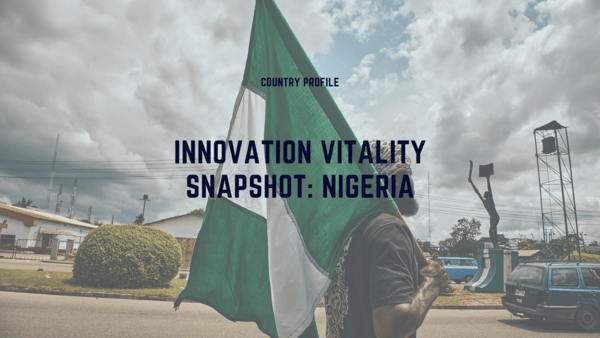
The word ‘innovation’ evokes a sense of novelty whenever it is the centre of discussion. Joe Tidd aptly describes innovation as 'the creation of value from ideas'. We will build on that foundation and describe innovation as the creation of value from ideas often embodied as products/services that are either new to market or new to companies, as well as the disruption of or creation of new industries. The degree to which nations engage in innovation activities (inputs) and produce innovative solutions (outputs) is extremely important to monitor. We refer to this as Innovation Vitality.
Measuring Innovation Vitality
A description of the framework employed in the study is provided below:
The commercialisation of IP: This is the revenue a nation receives from commercialising its Intellectual Property. Indicator: IP Receipts, High tech exports, and Trade statistics.
Human Capital: This measures how productive a nation’s labour force is as well as the skills of the general labour force as well as the extent to which a nation invests in people’s development. Indicators: % of researchers, literacy rate, % of scientists, tertiary enrolment, unemployment rate.
R&D Performance: This measures the proportion of a nation’s GDP spent on Research & Development.
ICT Infrastructure & Performance: This measures the technological capacity, output and inclusivity of a nation. Access to electricity, Mobile Penetration Rate, ICT Services Exports.
Entrepreneurial Friendliness: Measures the ease and speed of new venture creation within a nation. Ease of starting a business (World Bank).
To be brief, the country profiles will present only a few of the indicators.
Nigeria's Innovation Vitality Profile
Starting a Business Score: 86.2 (World Bank)
Starting a Business Rank: 105 (World Bank)
High Tech Exports
Despite the anomaly that occurred in 2015, Nigeria is not a high-tech focused nation when it comes to high-tech exports. The 2019 figure of 1.48% is dwarfed by the world average, 21.08%. Furthermore, Sao Tome, Rwanda, Cote d’Ivoire, and Burkina Faso all export more high-tech goods and services than Nigeria.
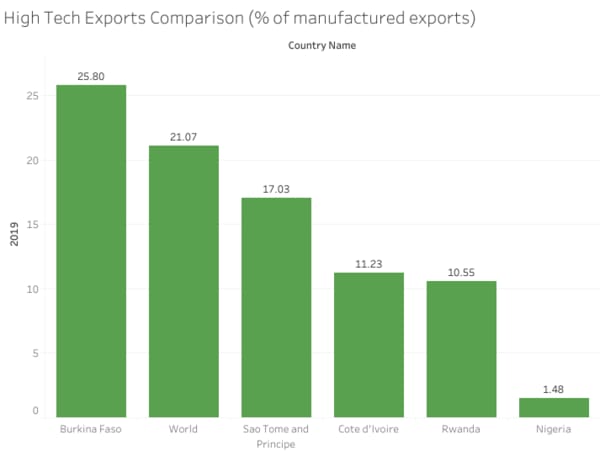
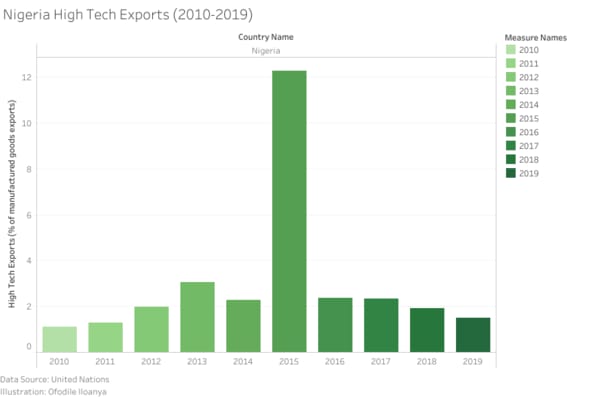
ICT Service Exports
This measures the value of Information, Communication and Technology services that are exported by a nation. It includes services related to telecommunications, courier, and news-related services. The graph below shows the extent to which Nigeria’s ICT services exports have grown in recent years. The rapid increase from 2015 should be a source of optimism and could be attributed to an increase in ICT investment and Nigeria’s thriving start-up ecosystem that has seen a surge in Software as a Service (SaaS)-oriented start-ups. ICT is important to a Nation’s innovation efforts because it facilitates knowledge sharing and connectivity. In 2006, ICT service exports only constituted approximately 1% of service exports while in 2017 it had risen to more than 6% of service exports according to the International Monetary Fund (IMF).
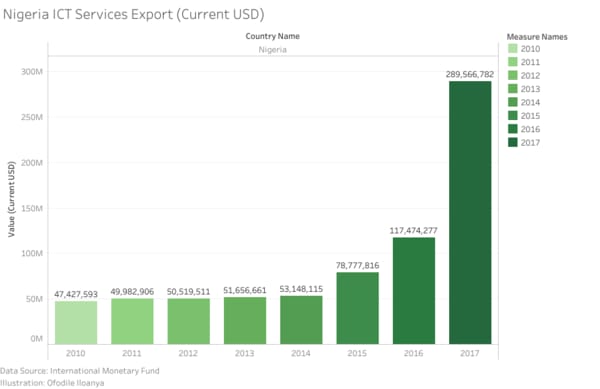
Human Capital
The capabilities of a nation’s labour force play a significant role in determining its innovation vitality. Nations with a relatively high proportion of researchers, firms that invest in R&D, and people in R&D tend to be more innovative as they spend more time creating new solutions to problems. World Bank estimates suggest that tertiary enrolment in Nigeria is only approximately 10%, which means alternative forms of skills development need to be implemented. Democratizing access to digital skills training needs to be at the forefront of entrepreneurs’ minds. According to the International Labour Organisation, 9% of Nigeria’s labour force were unemployed in 2020.
Access and Connectivity
Nigeria has not been able to drastically increase the proportion of people who have access to electricity since 2010. The fact that around 45% of the population does not have access to electricity could stifle innovative efforts in the same way it could spark the innovative spirit. Nonetheless, the latest mobile subscription penetration rate of over 90% suggests there is plenty of opportunity for low-cost innovation.
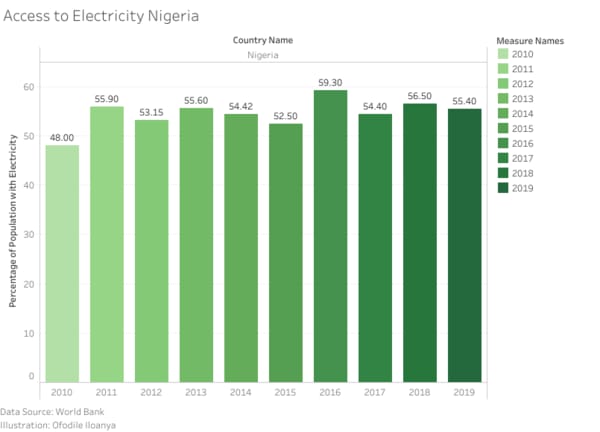
GDP Performance
Despite strong growth between 2010 to 2014, Nigeria’s economy experienced shrinkage between 2014-2017. Pre pandemic Nigeria was showing promising signs of recovery and it could be argued that it did not suffer a drastic decline as initially expected. Although Nigeria is one of the largest economies in Africa, the GDP per capita indicates that citizens’ wealth is concentrated at the top of the income spectrum. The GDP per capita has been shrinking since 2015.
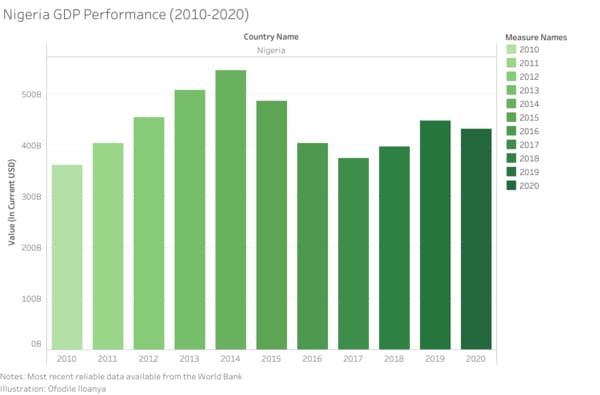
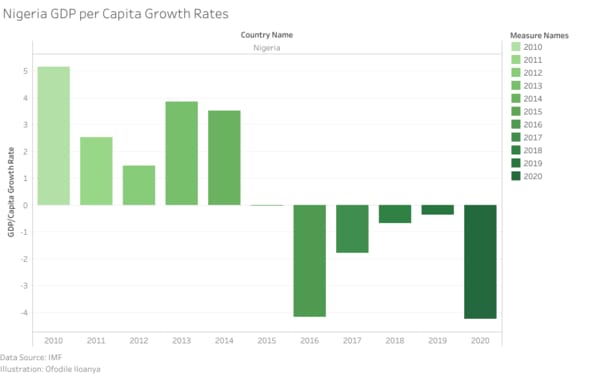
New Business Registrations
New venture creation has been on the rise since 2006: by 2018, the amount of new business being registered was already 2.5 times more than in 2006. One can assume the number of new businesses in the informal sector is much greater than this. New venture creation is extremely important to economic growth as it indicates citizens and companies are actively creating solutions to problems and competition generally leads to a wider range of options for consumers. New business formation has a few noteworthy implications for a nation: an increase in competition, higher productivity, innovation, and employment opportunities. The magnitude of these implications depends largely on the resource endowment of the new entrants and incumbents.
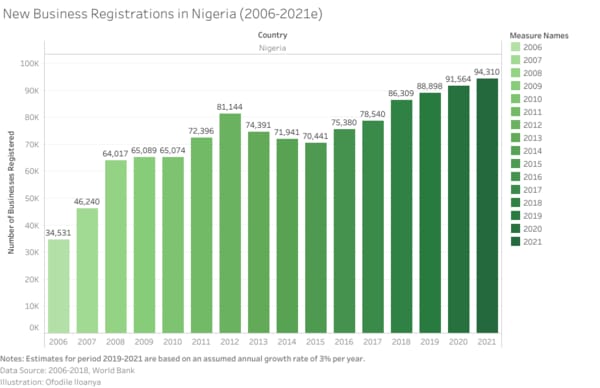
In a Nutshell
Nigeria could be described as a tale of two worlds, there is no denying that it has a strong innovation capacity but more needs to be done in terms of creating innovative solutions that improve the wellbeing of the wider population. A nation as large as Nigeria ought not to have close to half the population without access to electricity. Furthermore, education needs to be elevated as this will aid in Nigeria's innovation efforts. Nonetheless, the data suggests a clear shift of focus to ICT investment and this could be extremely beneficial in the long term.